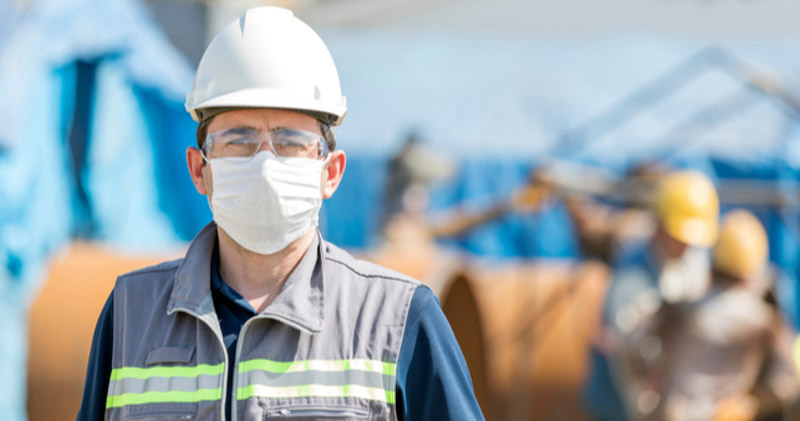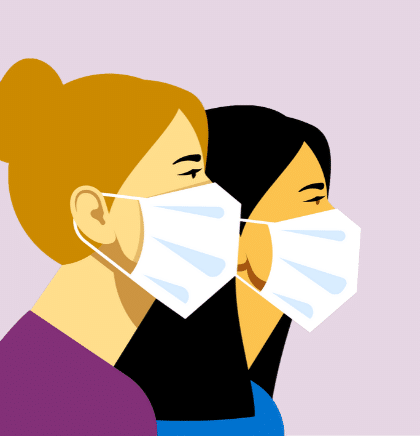
With the resurgence of community transmissions of COVID-19 in Victoria and, to a lesser extent, New South Wales, the benefits of wearing a face mask has again taken centre stage. While social distancing remains the most effective step in the fight against the spread of the coronavirus, the wearing of masks is an important additional measure to help stop the spread.
Wearing face masks in the workplace helps keep you and others safe, as face coverings help stop the spread of COVID-19 by preventing droplets spreading when someone speaks, laughs, coughs, or sneezes, including someone who has coronavirus (COVID-19) but doesn’t feel sick.
Note, this information is correct at the time of writing. Please make sure to check your local state or territory government’s website to see for the latest information on public health orders.

COVID-19 Latest Restrictions Update
Some restrictions have been introduced. Please stay up to date here.
Do Your Workers Need to Wear Face Masks?
If in Victoria, yes. Unless your employee meets one of the reasons for exemptions for wearing a mask, such as a medical condition, then wearing face masks is mandatory. In New South Wales, it is not mandatory, but it is recommended, especially in ‘hotspots’ with known cases of COVID-19 community transmission.
Current General Advice on Face Masks
The wearing of masks is now required in Victoria, while New South Wales residents, especially those in areas where outbreaks have occurred, are encouraged to wear face masks, in particular in situations where physical distancing is not possible.
Victoria’s Current Face Covering Restrictions
As of 11:59pm on Sunday 2 August 2020, all Victorians have to wear face coverings when they leave home, no matter where they live. This means either a face shield or a face mask, such as a surgical mask. Face coverings need to be worn covering both your nose and mouth. There are a number of lawful excuses for not wearing face masks or shields, as outlined below.
Lawful Excuses or Exceptions For Not Wearing a Face Covering
There are exceptions where a face covering is not required, including:
Infants and children under the age of 12 years.
A person who is affected by a relevant medical condition, including problems with their breathing, a serious condition of the face, a disability or a mental health condition.
Persons who are deaf or hard of hearing, where the ability to see the mouth is essential for communication.
Persons for whom wearing face masks or shields would create a risk to that person’s health and safety related to their work, as determined through OH&S guidelines.
Persons whose professions require clear enunciation or visibility of their mouth. This includes teaching or live broadcasting.
Professional sportspeople when training or competing.
If you are working on your own property with members of your household, but no staff or contractors are on site.
When you are doing any exercise or physical activity where you are out of breath or puffing. Examples include jogging or running, but not walking. You must carry a face covering on you and wear it when you finish exercising.
When directed to remove the face covering to ascertain identity.
When you are travelling in a vehicle by yourself or with other members of your household.
When consuming food, drink or medication, including when seated at a restaurant where permitted.
When undergoing dental treatment or other medical care to the extent that the procedure requires that no face covering may be worn.
During emergencies.
You must carry a face covering with you when leaving home, even if you don’t need to wear it while undertaking your current activity. For example, you can take your face covering off to eat or while you are running, but you must carry it with you at all times and put it back on when you finish.
Frequently Asked Questions
Are Face Masks Effective for Protecting Against Coronavirus (COVID-19) Transmission?
Yes. Face masks and surgical masks are one of a number of ways that the community can combat the spread of COVID-19. But it’s important to note that face coverings are effective when used in conjunction with other deterrents, such as practicing good hand hygiene and social distancing.
Can I Direct a Worker to Wear a Face Mask?
In Victoria employers must take reasonable steps to ensure employees wear a face covering at all times when working. In other states, you can direct a worker to wear personal protective equipment, including a face mask, if you, in consultation with those workers, decide it necessary to minimise the risk of exposure to the COVID-19 virus.
The Australian Government Department of Health suggests the main benefit of wearing a mask is to protect other people. If the person wearing the mask is unknowingly infected, wearing a mask will also reduce the chance of them passing the virus on to others.
Can I Direct Workers not to Wear a Mask?
The Australian Government Department of Health recognises that there may be occasions when it is recommended that the general public wear face masks where there has been community transmission of COVID-19 and physical distancing is difficult to maintain. Some workers may want to wear personal protective equipment even if you, as the employer, decide that it is an unnecessary control measure for your workplace. However, whether you can direct workers not to wear a mask will depend on whether the direction is permitted by the model WHS law, or is otherwise lawful and reasonable. This will need to be determined on a case by case basis. However, if your worker is working on their own at home and using their own masks, it is unlikely the direction would be reasonable. In Victoria workers must wear face masks unless exceptions apply.
Do I Need To Provide Masks to Workers?
As an employer (other than in Victoria where it is mandatory), if you decide you want your workers to wear face masks, you must provide them. You must also provide appropriate training and instruction on how to put on, wear, remove and dispose of the mask. Where an employee seeks to provide and use their own face covering at work, an employer must ensure that it is meeting its obligations under the OHS Act.
When is it Safe to Take Your Face Mask Off?
You can take off your mask once you are in your own home, away from other people, or in your car on your way home.
Can You Remove The Face Mask to Talk With Other People?
No. The whole point of face coverings is to prevent the transmission of COVID-19 by droplets spreading when people speak, laugh, cough, or sneeze. Remember, you or someone you are speaking with could actually have the coronavirus (COVID-19) but not be showing any symptoms of it.
Can an Employee Take Off Their Face Mask if They Find it Uncomfortable Whilst Working?
It’s understandable that some people may require short breaks from wearing their masks. If that’s the case, then they should ensure they are not near other people and follow the recommended advice for removing and reapplying their masks.

FREE COVID-19 Resource Kits for Employers
Get access to free resources to help you make sure you’ve prepared your workplace for employees and visitors.
BrightHR helping you manage your people and business
Contact us to find out how BrightHR people management software and help you manage and store your essential employee records and documents.
